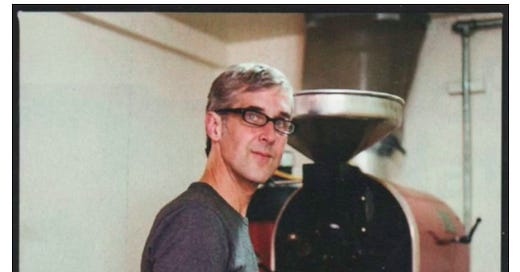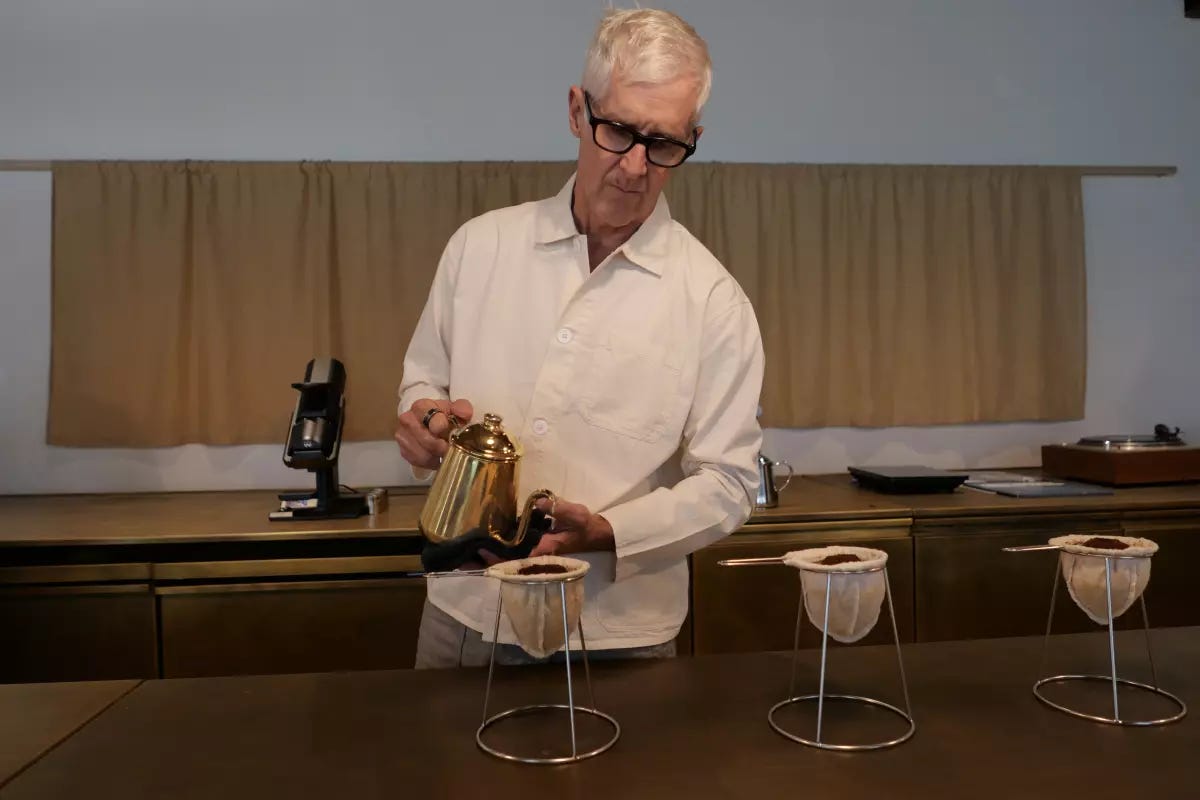If I told you that, as a classical musician, you could start a company, build it for 12 years, and sell 68% of it for $500 million dollars, would you believe me?
You should.
CNBC Make It characterizes professional clarinetist James Freeman as "a struggling classical musician roasting his own fresh beans as a hobby.”
Classical musicians are often characterized this way in the media—‘get a real job’ vibes abound.
You know why I hate notions like this?
They are so ubiquitous—so pervasive—that we classical musicians subconsciously believe that we are supposed to struggle.
James Freeman proves the contrary.
The Oakland Symphony paints a more realistic picture of his life. In Freeman’s music career, “coffee helped fuel his long-distance travel. For eight years, he played the clarinet with regional symphonies throughout Northern California, often driving hundreds of miles for a gig.”
In other words, he started out just like us.
James Freeman was able to create a company like Blue Bottle BECAUSE of his classical music background.
I will show you how you can apply classical music skills like Focus and Elimination towards building a profitable business.
By the end of this newsletter, you will agree with me.
The Story
Founded in 2002, the first version of the Blue Bottle business worked like this:
Freeman noticed that “at the time, there literally was not a place in San Francisco one could go to get a bag of coffee with a roast date stamped on the back.”
This was his opportunity: differentiate his business by maximizing the taste of coffee and the customer experience.
To achieve this, he roasted coffee in 7-pound batches.
He sold the coffee within 24 hours of roasting to ensure peak, quality taste.
And finally, he delivered the coffee beans via a home-delivery service.
Quickly realizing the limits of his delivery system, Freeman opened a 186-square-foot coffee kiosk in Oakland, California’s Temescal District.
In 2004, 2 years after this pivot, Freeman’s stand quickly became characterized by “long lines of customers who wait for its individually brewed cups of coffee.”
A year later, Freeman moved locations to a converted garage in the heart of San Francisco. This locations remains open today.
Finally seeing some success, Freeman explains, “I saw coffee as a place, a little refuge, where I could work out the things I’m interested in, but also this opportunity to not play clarinet anymore. So, something that might pay my bills, so I don’t have to go to gigs.”
He took the escape hatch and never looked back.
Between the years 2012 and 2017, Blue Bottle received $120 million in VC funding.
In 2017, Nestle purchased a majority stake (68%) in Blue Bottle. Though this deal’s financial details were never publicly disclosed, the Financial Times reported that this stake was worth close to $500 million.
The Lessons
Focus
The highest levels of classical music require intense focus. You develop an ability to sit alone for hours and practice every single day. Do not discount this skill.
The ability to focus is becoming a rare skill—rarer with each passing day. This is your advantage.
Like practicing an instrument, building a successful business requires that you focus on the most dire problems in your business at any given time.
Solutions to complex problems present themselves during periods of intense focus.
When a classical musician practices, they focus on creating solutions to specific musical problems.
When a business owner practices, they focus their study on their business. They look for obstacles that hold their business back. They then develop solutions that clear the path of obstacles.
James Freeman made many pilgrimages to Chatei Hatou, a cafe near Shibuya Station in Tokyo. Known for brewing individual cups of coffee for $15 each, the cafe gave Freeman inspiration. He characterized their cups of coffee as “life-changing perfection.”
Chatei Hatou dedicates an intense focus on every step of brewing a single, perfect cup of coffee. By adapting this focus to his own company, Freeman built Blue Bottle’s strategic edge in the emerging “third-wave coffee” market.
Finally, focusing your messaging can help you build a brand that stands out. Freeman again:
“[If] you think about the world, even on a coffee cart, shouldn’t every utterance and every image have some kind of meaning? Shouldn’t they reflect some important goal, even if not in an overt way?”
Master the art of focus and no problem will be too big for you to solve.
Elimination
Our first instinct as business owners is to add MORE.
Freeman thinks differently.
He understood a simple fact: maximize what matters most in your business. By eliminating everything else, you can create space to highlight the magnificence of your main focus.
If your game is delivering the highest quality coffee experience possible, frivolous distractions like shelving or expensive furniture do not matter. Instead, optimize your coffee brewing process, one cup at a time.
Classical music taught Freeman the importance of space.
“One of the handy things about having a background in musical performance is that it’s about that same through-line. Even the silences between movements have meaning that you want to communicate to an audience. How you take a breath influences how people interpret the emotional tone of what’s to come. It influences how you might play emotionally. That way of thinking was not foreign. Having to pack every possible sense of meaning into silences, as well as sounds, translates quite easily into a confined space such as a sign. What should the words and typography look like? I wasn’t an expert in that, but I was an expert in projecting an emotional tone and meaning from every possible utterance.”
Instead of doing more, figure out how to eliminate unnecessary operations and elevate the quality of what remains.
For example: with Whole Soul Music LLC, we aim to deliver the highest quality string playing for our clients.
We only present string music as a service.
If a client wants us to put together a band with a singer, we tell them “we only offer string services,” and promptly connect them with a business that can assist them.
We aim to eliminate products outside of our circle of competence and we aim to dominate our focus: string playing and composing.
Takeaways
When he started his company 19 years ago, James Freedman wasn’t dreaming of a $425 million exit.
All he had was a passion, a career pivot, and $15,000 in credit card debt.
The story of Blue Bottle is a case study in building a focused brand with a single passion as the centerpiece: create the most perfect tasting cup of coffee as possible, and do it one cup at a time.
Their core goal is to deliver “delicious coffee made by a hospitable coffee professional.” Any element that did not service this purpose was ousted.
Freeman did not allow “unhelpful feedback on how much competition there was” to deter him.
He recognized that market leaders, Starbucks and Peet’s coffee, were branding their coffees as “luxury products.”
Knowing better, Freeman was determined to show the market what luxury coffee actually tastes like.
The resulting company was so attractive that 158-year-old Nestle, the world’s largest food and drinks company and Europe’s 4th largest company by market capitalization ($276 Billion), took one look at it and said:
“Yeah, I’ll take 68% of that.”
If you don’t remember anything from this newsletter, remember this. To create a successful company in a saturated market, you must:
Intentionally build a brand around a product that delivers value to a niche subset of your target market.
Tweak your product until it has an undeniably unique value proposition.
Continually optimize the customer’s experience of your product by creating space. You can create space by eliminating non-essential distractions from your product.
Every aspect of your brand must be consistent across all media.
My Challenge to You
Clarify the core goal of your brand.
Write it down.
How is your product different from your competition? Do customers care about this differentiation? Why?
Ask yourself: instead of adding more features, services, or products, what can I remove? Am I currently doing something that distorts the clarity of my core goal?
Reply to this email and tell me what you came up with.
Additional Reading and Resources
Oakland Symphony: James Freeman
Otherwise, I’ll talk to you again next Friday. #PlayHomiePlay
Drew








